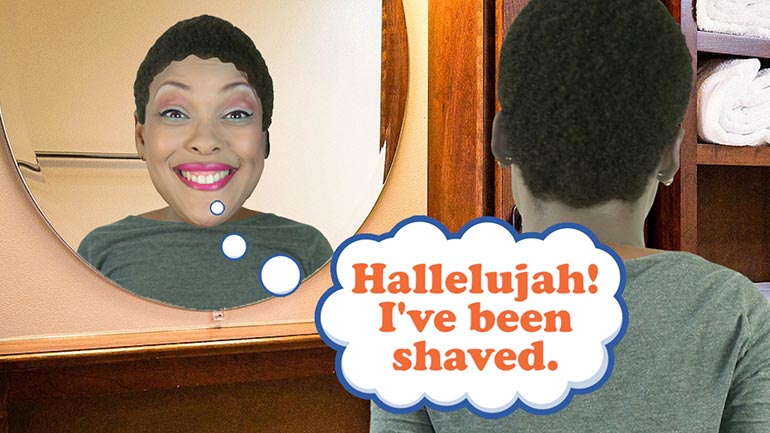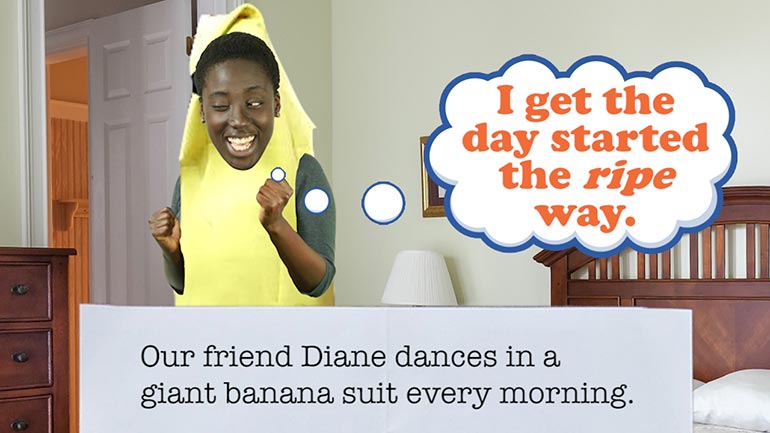ShmoopTube
Where Monty Python meets your 10th grade teacher.
Search Thousands of Shmoop Videos
ELA 4: Using Strong Verbs instead of Weak Ones 102 Views
Share It!
Description:
Strong verbs are perfect for conveying heavier and more striking meanings to your sentences. They're a lot more exciting than weak verbs are. Just look at those muscles.
Transcript
- 00:05
[Dino and Coop singing]
- 00:13
Whether you're speaking or writing, you're always using verbs.
- 00:17
Unless, of course, you’re trapped under something heavy, and then words are a little hard to get out. [Guy stuck under a rock]
- 00:21
But did you know that not all verbs are created equal?
- 00:24
Some are weak, while others are strong. [Strong verb in the gym]
Full Transcript
- 00:28
And it's always better to use strong verbs whenever possible.
- 00:31
If nothing else, they can always help you change a tire if the need arises. [Strong verb lifting a car up with one arm]
- 00:35
Weak verbs are verbs that have no power. [Weak verb with floppy arms]
- 00:38
Meaning that they're not very descriptive, or they're generic, or they just don't have [Coop pointing at a blackboard]
- 00:41
that oomph you're looking for.
- 00:43
Strong verbs, on the other hand, are to the point, descriptive, less common and important-sounding, [Dino pointing at a blackboard]
- 00:49
and they carry a whole lotta oomph.
- 00:52
We’re talking oodles of oomph. [Dumper truck with the word oomph falling out the back]
- 00:54
Now we know what you're probably thinking: “what in the world does that actually mean,
- 00:58
and why do I want my verbs to have oomph anyway?” [Guy looking thoughtful in front of his computer]
- 01:01
We get it.
- 01:02
It's a bit confusing, and a little hard to describe what exactly the difference is between them.
- 01:06
So, we’ll show you.
- 01:08
Look at this image.
- 01:09
Sure, you could say that Suzy is going to the store. [Suzy stood in a store car park]
- 01:12
But that would be weak.
- 01:14
“Going to” doesn’t really tell us much, aside from the basics.
- 01:18
Instead, we could say Suzy is walking to the store.
- 01:20
Okay…so now we know how she got there. [Suzy walking in the palking lot]
- 01:23
She didn’t take her bike, or fly there. [Suzy flying on her bike with ET in the basket]
- 01:26
But what if we said, “Suzy is skipping to the store.”?
- 01:30
Skipping.
- 01:31
Now that's a strong verb.
- 01:33
It's a bit unusual, in that you don’t see the word all the time…and it’s exciting,
- 01:37
and descriptive, and carries boatloads of oomph.
- 01:40
Check out Thomas here.
- 01:42
We could say “Thomas sat in the chair,” but that's so boring and weak. [Thomas sat on a couch]
- 01:46
Not you, Thomas. Chillax. [Thomas jumps out the couch and looks angry]
- 01:48
Instead, we could say that Thomas slouched in the chair.
- 01:51
Much stronger.
- 01:52
Much clearer.
- 01:53
When Jessica's goldfish died, some might say she cried. [Girl looking sad]
- 01:56
But since we're in the business of using strong verbs, we would say that she mourned.
- 02:02
Instead of “jump” we could use “leap.”
- 02:04
Instead of “threw” we could say “chucked.”
- 02:06
Instead of “laughed” we might try “cackled.”
- 02:08
You get the idea. [The weak and strong verbs being written on a blackboard]
- 02:09
When you're speaking and writing, you want your words to be as powerful as possible,
- 02:13
and that means using the strongest verbs you can come up with. [Weak verb and old guy in the gym turn strong when an explosion goes off]
- 02:16
So the next time you're writing, don't be weak.
- 02:18
Be strong! [Teacher crushes chalk]
- 02:19
It will make your sentences jump right off the page.
- 02:22
Sorry…leap right off the page. [The word leap jumps off a diving board]
Up Next
Sticks and stones, right? Well...only sometimes. It's a good idea to make sure your words aren't going to hurt others. Let's look at some ways to d...
Related Videos
Learn to debate like a champ. It's way better than debating like a chimp. That just takes mudslinging to a whole new level.
Today we'll learn about biographies and autobiographies. And no, the second one has nothing to do with the lives of cars.
In this lesson we'll subject you to some verbs and predicates. Each one is a necessary part of a complete breakfas—er...sentence.
Choosing words carefully is important. You may end up vexing the assemblage of citizens you're conversing with...or you might even just plain bore...




